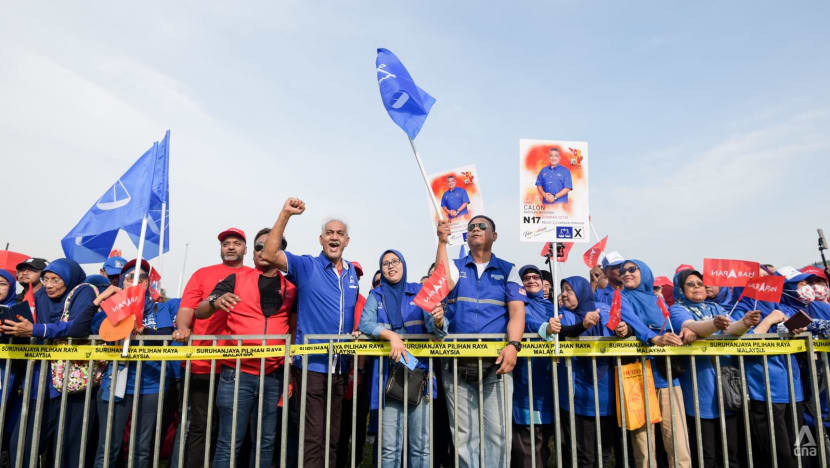Malaysia state polls: Parties going all out to win over urban poor in country’s richest state Selangor
Selangor, Malaysia's most developed state, has been under the Pakatan Harapan (PH) coalition’s rule for 15 years.

Pakatan Harapan (PH) and Barisan Nasional supporters outside a nomination centre Sungai Pusu, Selangor, on Jul 29, 2023, ahead of Malaysia's state elections. (Photo: CNA/Fadza Ishak)
SELANGOR: Political parties campaigning in economic powerhouse Selangor are looking to win over the urban poor, who struggle with issues such as a lack of job opportunities and access to public health facilities.
Selangor, Malaysia's most developed state, has been under the Pakatan Harapan (PH) coalition’s rule for 15 years, and losing the crown jewel is simply not an option, said observers.
Parties are going all out to win over fence sitters at the upcoming state polls with walkabouts and rallies.
WINNING OVER FENCE SITTERS
“Elections are never won through your hardcore supporters, it’s always about how much of the fence sitters that you can sway to your side,” said Economy Minister and PH national election director Rafizi Ramli.
“From the last general election, the swing happened at the last minute. So I am very cautious and we are monitoring it very closely.”
However, the prolonged economic hardships are testing voters' patience.
Some said they have not seen much change so far, while others believe the governing coalition should be given more time.
In Taman Medan, a densely populated Malay enclave in Selangor, rising living costs, worsening traffic congestion and poor healthcare facilities are among residents’ concerns.
.jpg?itok=5ndzm0ph)
Taman Medan resident Azlan Zulkifli said salaries are not keeping pace with the high cost of living.
“Previously, RM150 (US$33) could buy you a shopping basket’s worth of items. Now, you can’t even fill half a basket (when spending the same amount),” he noted.
Taman Medan, which has a high concentration of urban poor, is among 39 Malay majority seats in Selangor which the opposition Perikatan Nasional (PN) is targeting in the 56-seat state assembly.
Residents expect the problems to get worse with rapid urbanisation. The only government clinic in Taman Medan, for example, is reportedly bursting at the seams.
"It’s overpopulated now,” said Mr Azlan. “Last time, there were squatters, but now they’ve built flats, so more and more people are living here.
“The population needs to be reduced or we need to add more facilities. One clinic is not enough to cater for 200,000 residents."
OPPOSITION PN BANKING ON STRONG MALAY VOTER TURNOUT
PN candidate Afif Bahardin claimed that there are about seven state seats such as Taman Medan, with a sizable population of urban poor and where the economic pains are acutely felt.
“Selangor should not be positioning themselves, comparing themselves to Kelantan and other states,” said Dr Afif.
“They should be comparing themselves to Singapore, comparing themselves to the big cities like Hong Kong or Taiwan.”
He added that PN needs a strong Malay voter turnout in order to wrest the Selangor state from the PH coalition.
“We are focusing on bringing out the voters. We want the percentage of voter turnout to be higher. Especially in the Malay areas,” said Dr Afif. "Here, it is less than 79 per cent, but if I can get to 88 per cent to 90 per cent, I just need the Malay votes to win.
In the recent general election last November, the majority of Malays voted for PN.
Meanwhile, Prime Minister Anwar Ibrahim hopes that his PH alliance with Barisan Nasional will regain some Malay support.
He has also unveiled his Madani Economic Narrative to put the country on a stronger economic growth path and elevate the quality of life for the nation.
Promising more cash handouts for low and middle income groups, he said: “The focus must be on helping the needy regardless of ethnicity and region.”















.jpg?itok=7j-kYZI-)




